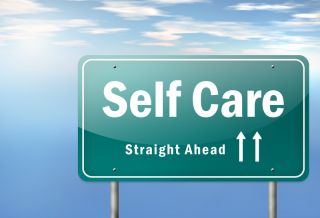
Self-care?!
As a becoming dance/movement therapist I am constantly reminded of the importance of taking care of myself. Especially during my internship and while working a 7 day week I experienced first hand how the absence of self-care can effect and even sabotage the therapeutic work. Missing concentration, feelings of disconnection, and an decreased ability to self-regulate were just some of the indicators I was experiencing.
Of course, the topic of self-care is an integral part of Columbia’s DMT&C program, but it is still the responsibility of the student to engage in it and to make it their own. And I think this is one of the most important realizations I had after completing and probably because of going through the program: making self-care my own…what does that mean?

Self-care?!
When you type self-care into Google you will get a variety of tips and tricks on how to do it. From self-care lists and self-care guides, to self-care services; there is a bulk of information out there and looking at it one might think that engaging in self-care should be as easy as popping a pill. A self-care pill, in a sense. But the reality often looks different. Even when people engage in such popular self-care practices as yoga, taking a bath, getting a massage, implementing health care habits (enough sleep, healthy eating, meditate, taking breathers throughout the day – literally) some might still feel exhausted and – in a sense – unhealthy. And this has nothing to do with those techniques not generally being effective. They are and many people benefit from them. However, just as each person is unique in their physical, emotional, psychological, relational, spiritual, and professional needs (categories which are often named when talking about self-care) so are their needs when it comes to self-care practices. There is no “one size fits all” self-care practice.

Timelessness ~
So when I talk about “making self-care one’s own” I am talking about developing the insight into what truly works and, therefore, brings one in a state that promotes well-being. Developing this insight has been quite a journey for me, too. I tried many things, including those mentioned above, which have helped friends and colleagues of mine. But none of them really seemed to work and I started to wonder if I am simply unable to take care of myself (a scary thought when you are working as a mental health professional). But then I started to look at the whole topic from a different perspective. I stopped looking at what activities/practices/things I did for self-care and started focusing on which state I wanted to achieve. This might seem banal, but I had always thought of self-care as a practice and not necessarily as a state of being. And while I was thinking about my personal “self-care states” I realized that they all have two things in common: they have a timeless quality (meaning time does not matter or I have the feeling time stops) and they engage me mentally (e.g. spark my curiosity or creativity). From that standpoint it was easier for me to think about the things that bring me into that state: drawing, visiting a museum, reading a good book, engaging in good communication, and many more. I also realized that it depends on the situation and environment that I am in.
As a conclusion, yes it is important to engage in self-care practices, no matter where you currently are in your life; if you have just submitted your application to a graduate program, anxiously awaiting their reply, if you are currently in school or already working. Self-care is important in all walks of life. But just as important is it to figure out what kind of self-care practices truly work for you. Because if it does not work and does not bring you in a state that promotes well-being then it is just another thing on your schedule and not self-care at all.
